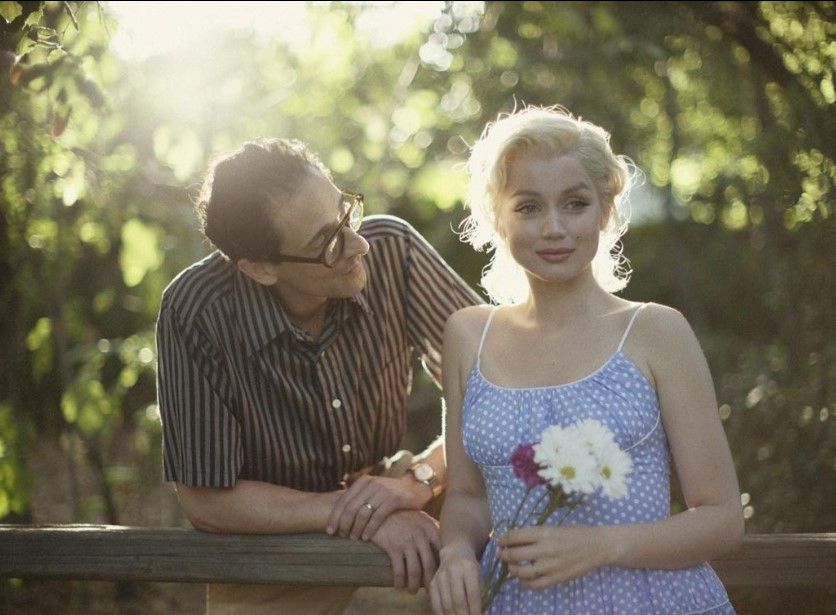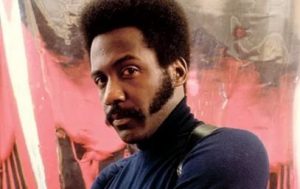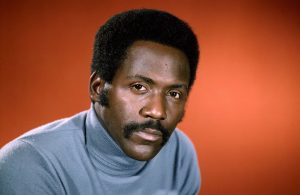Andrew Dominik’s Blonde on Netflix is a hellish view of a star undone. Ana de Armas digs her heels in deep as Marilyn Monroe, the American actor and icon. The 34-year-old Cuban peels the layers back to reveal a fragile Norma Jean, the girl who does not want the spotlight and desires to settle down.
The 2hr 46min movie shows Monroe’s demons, which start from her childhood. A mother with addictions and her own set of problems turns abusive in the absence of a father and tries drowning a young Norma Jean. She gets out with her life- barely -and is sent to an orphanage. Gradually, her stardom grows, first as a pinup girl and then in the movies, when she’s “discovered” by Mr Z. The Fox Studios executive violates her in his office before Monroe lands the contract with the company.
Also Read | Who are Marilyn Monroe’s parents?
Dominik sends Monroe on her path to fame with the song Every Baby Needs a Da Da Daddy. As she becomes more famous, Norma Jean remains focused on finding her father. When visiting her mother, she recounts trying to find her father’s identity among those working at Fox Studios. However, he remains elusive. The lack of a father figure colours Monroe’s relationships. In both her marriages to Joe DiMaggio and Arthur Miller she refers to her partners as “daddy”, and is drawn to the former due to his offers of protection from the harsh spotlight of stardom. The night DiMaggio proposes, Monroe initially goes to her hotel room expecting to meet her father.
Miller appeals to and understands Norma’s intellect – seeing her as more than the star that studios would have the world believe. While conversing about Miller’s play, Norma Jean draws a comparison to Anton Chekov’s work, and Adrien Brody’s character begins to see there is more to her.
Also Read | Norma Jean relationship with mother: Did she try to kill Marilyn Monroe
Dominik’s movie Blonde also shows Norma Jean swept up in a ménage à trois with Cass Chaplin and Eddy Robinson Jr, where she learns how the mirror can show her how the world sees her. This motif returns at a time when Norma Jean cannot seem to summon her stage character Marilyn Monroe – the woman who the cameras love, and the woman who loves her fans.
Amidst her many relationships, Norma Jean grows increasingly alone. With the Chaplin and Eddy relationship, she’s forced to abort her child by the studios to star in Gentlemen Prefer Blondes. Monroe’s marriage with DiMaggio ends in divorce after domestic violence from the athlete. Her relationship with Miller also grows distant after her miscarriage, but the first seeds of discontent are sown when Norma Jean discovers the playwright using their conversations for writing fodder. Blonde also steps into controversial waters, showing a sexual relationship between Monroe and then-US president John F Kennedy, and even portraying that Monroe’s child with Kennedy was aborted.
Each man wants something different from Monroe, but in the end, they all want the same thing from her. Bobby Cannavale’s DiMaggio wants her to make sacrifices in her career, and alter her image from that of a sex icon. When the Seven Year Itch skirt-blowing scene does the opposite, he resorts to violence. The Cass-Eddy duo give Norma Jean an outlet, but turn out to be just as selfish when they blackmail DiMaggio with negatives of some of Monroe’s indiscreet pictures. Miller, who offers Monroe the final out from a life of stardom, tries to use Norma Jean’s personal life as writing fodder, and Kennedy just uses her for sex.
Also Read | The controversies surrounding Marilyn Monroe
DiMaggio at one time refers to Monroe as “meat”, and that is how the world sees her as do her partners. Dominik in a scene, shows the audience awaiting Monroe ahead of her movie premiere. The slow-motion makes it seem like a pack of beasts waiting to pounce on the car, and the men’s faces chanting her name turns into something almost grotesque. For someone who started her career by being raped, as per the movie, and then went on to be objectified, Monroe deals with stardom with an ironclad smile for the most part. At other times she comes unravelled, like when she screams at the director of Some Like it Hot for the line about Monroe which compares her movement to “jello on springs”.
With all this happening in Norma Jean’s life, and with so many people asking so much of her, all she asks for is her father. Norma Jean never gives up hopes of seeing her father, and a constant chain of letters from him keeps her hopes alive. When Monroe has lost everything – her relationships, her children, and has only her fame – which she considers hollow – to hold on to, she still has hope of meeting her father.
However, that is dashed after Cass’ death, when it turns out he was the one pretending to be her father. Truly alone in the world, Norma Jean abandons her screen persona and gives up her life. The final moments of the movie hint at a more eternal chance of meeting her father.
Also Read | Blonde movie vs Marilyn Monroe’s life: How much is real?
Dominik’s Blonde portrays Monroe as a deeply troubled woman beneath all the fame, a woman at odds between being a star and not desiring anything that comes with it. Ana de Armas is splendid in her role as are Brody and Cannavale in theirs. Blonde shows the loneliness of Hollywood and the scrutiny of the spotlight. The film is a testament to mental health problems and how women are objectified and seen as mere flesh in the film industry – a practice that is changing for the better in a post-MeToo society.
Blonde shocks, and despite the relatively long runtime, the movie does not drag. Dominik chooses to leave some frames out of focus to give his central character some moments of privacy, and even as the camera adjusts on de Armas’ Monroe, we almost do not want to see her then, preferring to leave her alone to her demons. The film shows her delirium, which only increases, her depression after the abortions and miscarriage, and her paranoia, coupled with the dreams of a young girl – all of which send a smart, shining star spiraling to her own death.
There’s much more to Monroe than the cameras ever saw. Dominik and de Armas raise that uncomfortable truth successfully, though many might accuse Blonde of having overdone the self-loathing in some parts.







